In January 1977 a young punk band called Buzzcocks walked into the Manchester branch of Virgin with a box of singles they wanted to sell. They had set up a label called New Hormones and paid for the records themselves with an early form of crowdfunding – borrowing £500 from a couple of friends and the guitarist’s dad – and their only ambition was to sell enough of the 1,000 copies they had pressed to be able to repay the loans. The Spiral Scratch EP ended up selling 16,000 copies and reaching the top 40 – there was no problem with the loans. More importantly, though, it proved that it was possible for artists to be in complete control of their music, from production to distribution, and in the process invented indie.
These days, there’s nothing unusual about bypassing the record industry. Chance the Rapper self-released his music and has become a breakout star and Barack Obama’s guest at the White House. In 1977, though, Spiral Scratch was game-changing. In its wake came a wave of British independent labels and a distribution network that meant that, as Rough Trade founder Geoff Travis puts it, “anyone could compete with the big boys, but that only happened because it was an undeniably great record”.
Few who saw the first Buzzcocks show on 1 April 1976 would have felt they were in the presence of people who were about to reshape pop. Peter McNeish and Howard Trafford (who would become Pete Shelley and Howard Devoto) fronted a makeshift version of the band at Bolton Institute of Technology’s students’ union – they were studying there – and managed to annoy not just the venue, but their bandmates, too.
After the venue pulled the plug, their drummer – who had never rehearsed with them before – laid into Shelley and Devoto. “He said: ‘I’m at this level’ – and held his hands very high,” Shelley, remembers, “‘and you’re down there.’”
Shelley and Devoto had been inspired to form Buzzcocks seven weeks earlier, when they read a live review in NME that would transform their lives. The headline, “Don’t look over your shoulder, but the Sex Pistols are coming!”, was enough to convince them to borrow a little Renault and drive 200 miles to High Wycombe in Buckinghamshire to see the Pistols support Screaming Lord Sutch on 21 February.
“Seeing the Pistols changed everything,” Devoto says. “We started to realise what songs we ourselves could write.”
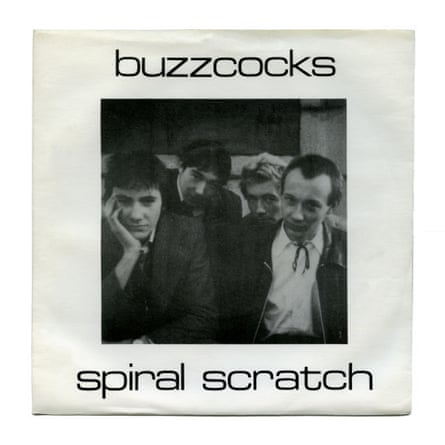
At this point, the Pistols were some way from becoming the band who outraged a nation. They were so short of bookings that their manager, Malcolm McLaren, agreed to the offer Shelley and Devoto put to him: they would put his charges on in Manchester, if they could be the support band.
The problem was, the pair didn’t have a band. And when the night of the gig at the Lesser Free Trade Hall arrived – 4 June 1976, with Shelley and Devoto having paid £32 to rent the room – they still lacked a permanent bassist and drummer and had to drop off the bill. But they quickly recruited bassist Steve Diggle and drummer John Maher, who joined while doing his O-levels as a way of avoiding “aggro” from his neighbours, and when the Pistols returned to the Lesser Free Trade Hall on 20 July, Buzzcocks were ready.
“I thought if I could join a band, I could get the drum kit out of the house,” Maher says. “How was I to know that my first gig would be supporting the Sex Pistols?”
Shelley, who was 22, remembers the show for its “complete lack of adult supervision. We were literally doing it ourselves. McLaren said: ‘If Buzzcocks aren’t onstage in 10 minutes, you’re not going on.’ But he was shrewd enough to bring music journalists.” When the journalists’ reviews appeared, Buzzcocks were catapulted to national attention.
Initially, they had no plans to make a record, but after the Pistols’ appearance on Thames TV’s Today show – swearing at the host, Bill Grundy – landed them on tabloid front pages and major labels started signing punk bands, Buzzcocks realised they had to make their mark or risk being passed by.
“Record company scouts just didn’t venture up to Manchester,” says Richard Boon, their manager. “The place felt like the tide had gone out.” But what other options were there? To Shelley, the idea of manufacturing a record themselves felt “as unfeasible as making a computer in your front room”.
There were already British independents: the Damned’s New Rose had been released on Stiff, but that label had the advantage of being run by people with lots of experience in the music business, and the contacts that came with that experience. It was a rather different matter for a pair of students whose only experience of records was buying them and listening to them. “The Drones told us: ‘Don’t do it!’” Shelley says. “Because they’d gone the vanity publishing route in a previous incarnation and ended up with boxes of records in the garage.”
However, the band’s new booking agent, Martin Hannett, wanted to become a producer and saw an opportunity in Buzzcocks. Boon started investigating pressing plants, to see whether they really could make a record, and as things started moving, Shelley began to think: “We can actually do this.”
It helped that by now they had a set of songs that matched those of any London punk band, led by Boredom (“You know me – I’m acting dumb / The scene is very humdrum / Boredom! Boredom!” Devoto sings, while Shelley picks out a two-note solo). Devoto wrote the lyrics during night shifts at a tile factory, and Shelley wrote the tunes on his Woolworth’s guitar.

“We were chalk and cheese,” Shelley remembers. “I said to him, ‘I never get around to things. I live in a straight line,’ That ended up in Boredom.” Shelly’s’s famous guitar solo – seen as the epitome of punk’s rejection of musicianship, and later resurrected by Edwyn Collins for Orange Juice’s Rip It Up – came “out of the blue and seemed to fit. After we’d finished it, we fell about laughing.”
Boredom, Breakdown, Time’s Up and Friends of Mine were recorded in 30 minutes just before Christmas 1976, with Hannett at the controls. Spiral Scratch launched his career, too, and he would go on to produce Joy Division and New Order, the Psychedelic Furs, U2, Happy Mondays and many more – including Buzzcocks after Devoto left, and Devoto’s next group, Magazine.
“My impression was that Martin didn’t know what he was doing,” Maher says. “But neither did we.” Devoto says of Spiral Scratch’s ramshackle, lo-fi sound: “As amateurs even we found it a bit amateurish sounding.”
Boon thinks the amateurishness is all part of the EP’s charm: Buzzcocks were the anti-Fleetwood Mac, the antithesis of big-budget music. He took Spiral Scratch’s cover photo of the band on a Polaroid instant camera and the band assembled at Devoto’s shared flat in Lower Broughton to slide 1,000 singles into their budget picture sleeves.
The first shop to take copies was Virgin in Manchester, which accepted 25 copies and sold them for 99p each (of which 60p went to the band). In London, Travis had just opened his Rough Trade shop. He took an initial 50, then ordered 200 more just two days later. “I knew I could sell them,” he says. “It was a sensational record.”
Boon didn’t have the money to press more copies, so Jon Webster, the manager of the Manchester branch of Virgin, lent him £600 from the shop’s sales of coach tickets to a Status Quo gig. “So indirectly, the first British independent success story was financed by the Quo,” Boon says, laughing. Webster remembers those pioneering punk days as “the best time of my life”, and notes that, back then, a record shop could be a catalyst for spreading new music. “Because there was no distribution, almost no shops had these records,” he says. “When we handed out a photocopied list of all our punk singles at the [venue] Electric Circus, we were deluged with people from all over the north.”
Soon enough, a copy of Spiral Scratch reached John Peel, who duly played it; it became single of the week in the music papers, and sales exploded via mail order. After Mancunian photographer Kevin Cummins gave Marc Bolan a copy and photographed him holding it, Boon’s landline started “ringing off the hook”.
Spiral Scratch provided evidence that punk was having an effect nationwide, that it wasn’t just confined to a small coterie in London. The cultural historian Jon Savage had just started his first fanzine when it was released, and it made him think Manchester punk “seemed more interesting than London punk, which was full of people with leather jackets and cocaine habits”. Just as important, the means of Spiral Scratch’s release epitomised liberation through DIY. “Suddenly the gap between wanting to do something and actually doing it seemed small,” Savage says.
Devoto’s idea of providing recording details on the sleeve – “Breakdown, third take, no overdubs” and so on – further demystified the process of making records, making it seem accessible to scores of young groups. Two months after Spiral Scratch was released, the Desperate Bicycles formed, and released a first single with a sleevenote that read: “The Desperate Bicycles were formed in March 1977 specifically for the purpose of recording and releasing a single on their own label.” That note inspired Green Gartside of Scritti Politti to form his own band and release a debut single on which he itemised the costs of production and manufacturing. Buzzcocks had started something that couldn’t be stopped
Indie labels began to spring up nationwide: in 1978, ZigZag magazine published a list of 120 labels that had punk acts on their roster; the vast majority of them were from outside London. Alongside the labels came a new breed of band: Webster remembers Ian Curtis coming into Virgin and declaring: “I’ve formed a band!” Then Rough Trade set up the indie distribution network that gave these new labels and bands some of the muscle their counterparts on the major labels had previously monopolised. “You could have a No 1 record and have nothing to do with the record industry,” he says. “It was tremendously empowering.”
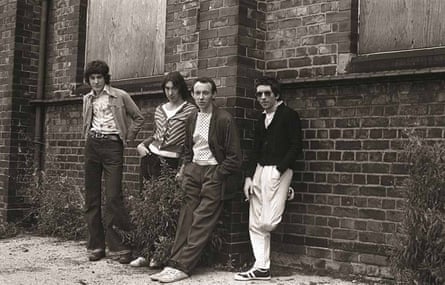
Buzzcocks Mk 1 didn’t survive their own earthquake. Devoto returned to college, and later formed Magazine. The new lineup of Buzzcocks, with Shelley singing, signed to United Artists and produced some of the best loved-music of the punk era. Forty years on, although there have been breaks along the way, Shelley and Diggle continue to lead Buzzcocks, and celebrated the band’s 40th anniversary with a world tour.
And all these years on, there are young bands doing exactly what Buzzcocks did. “I recently met the grime act Tough Squad, who told me how they press up 200 records, take them to shops and then go back for the money,” Boon says. “Just like we did.”
“It just shows what can happen if you’re stupid enough to believe that you can do something,” Shelley adds. “History is made by those who turn up.”
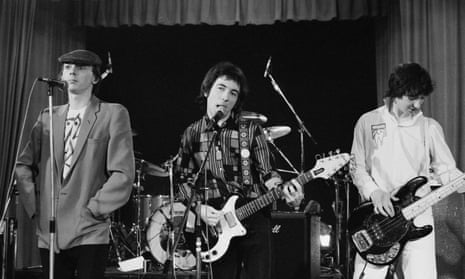
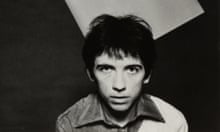

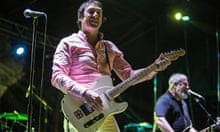
Comments (…)
Sign in or create your Guardian account to join the discussion